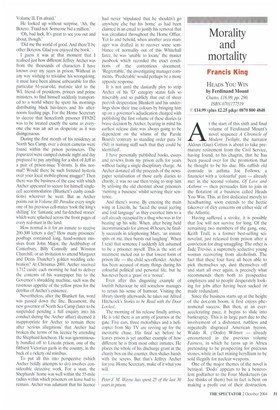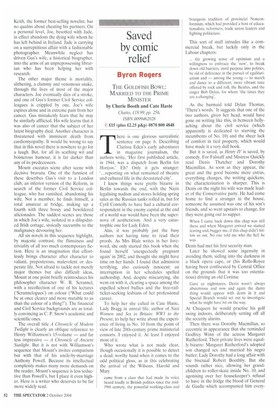Morality and mortality
Francis King
HEADS You WIN by Ferdinand Mount Chatto, £16.99, pp. 290, ISBN 0701177519 ft £14.99 (plus £2.25 p&p) 0870 800 4848 At the start of this sixth and final volume of Ferdinand Mount's novel sequence A Chronicle of Modern Twilight, the narrator Aldous (Gus) Cotton is about to take premature retirement from the Civil Service, having found, to his chagrin, that he has been passed over for the promotion that he thought to be his due. His raffish old comrade in asthma Joe Follows, a financier with a 'colourful' past — already met in the second volume, Of Love and Asthma — then persuades him to join in the flotation of a business called Heads You Win. This, at first dedicated merely to headhunting, soon extends to the hectic takeover of dicy concerns on either side of the Atlantic.
Having suffered a stroke, it is possible that Joe will not survive for long. Of the remaining two members of the gang, one, Keith Trull, is a former best-selling scinovelist, just released from prison after a conviction for drug smuggling. The other is Jade Treviso, a supremely seductive young woman recovering from alcoholism. The fact that these four have all been able to pick themselves up, dust themselves off and start all over again, is precisely what recommends them both to prospective employers and to people desperately looking for jobs after having been sacked or made redundant.
Since the business starts up at the height of the dot.com boom, it first enjoys phenomenal success. But then, at an everaccelerating pace, it begins to slide into bankruptcy. This is in large part due to the involvement of a dishonest, ruthless and repeatedly disgraced American tycoon, Waldo R. (Dodo) Wilmot — already encountered in the previous volume Fairness, in which he turns up in Africa pretending to be prospecting for precious stones, while in fact mining beryllium to be sold illegally for nuclear weapons.
One of the major themes of the novel is betrayal. -Dodo' appears to be a benevolent godfather to the Four Musketeers (as Joe thinks of them) but in fact is bent on making a profit out of their destruction.
Keith, the former best-selling novelist, has no qualms about cheating his partners. On a personal level, Joe, besotted with Jade, in effect abandons the dying wife whom he has left behind in Ireland. Jade is carrying on a surreptitious affair with a fashionable photographer. Meanwhile neglect has driven Gus's wife, a historical biographer, into the arms of an unprepossessing librarian who has been helping her with research.
The other major theme is mortality, slithering, a clammy and venomous snake, through the lives of most of the major characters. Joe eventually dies of a stroke, and one of Gus's former Civil Service colleagues is crippled by one. Joe's wife expires alone and in extreme pain from her cancer. Gus mistakenly fears that he may be similarly afflicted. His wife learns that it was also of cancer that the subject of her latest biography died. Another character is threatened with imminent death from cardiomyopathy. It would be wrong to say that in this novel there is nowhere to go for a laugh. But, for all its scathing wit and boisterous humour, it is far darker than any of its predecessors.
Mount executes scene after scene with decisive bravura. One of the funniest of these describes Gus's visit to a London club, an inferior version of the Reform, in search of the former Civil Service colleague, who has vanished, abandoning his wife. Not a member, he finds himself, a total amateur at bridge, making up a fourth with three boozy and bewildered aficionados. The saddest scenes are those in which Joe's wife, isolated in a dilapidated Irish cottage, stoically succumbs to the malignancy devouring her.
All six novels in this sequence highlight, by majestic contrast, the flimsiness and triviality of all too much contemporary fiction. Here is an imagination that effortlessly brings character after character to valiant, preposterous, malevolent or desperate life. Not afraid to tackle not merely major themes but also difficult ideas, Mount at one point briefly reintroduces his philosopher character W. R. Scrannel, with a recollection of one of his lectures (`Scrannelogues) on colour ('What could be at once clearer and more mutable to us than the colour of a thing?'). The financial and Civil Service backgrounds are as totally convincing as C. P. Snow's academic and scientific ones.
The overall title A Chronicle of Modern Twilight is clearly an oblique reference to Henry Williamson's 15-volume — and far less impressive — A Chronicle of Ancient Sunlight. But it is not with Williamson's sequence that Mount's invites comparison but with that of his uncle-by-marriage Anthony Powell. Because its intellectual complexity makes many more demands on the reader, Mount's sequence is less seductive than Powell's, but I place it even higher. Here is a writer who deserves to be far more widely read.



















































































 Previous page
Previous page